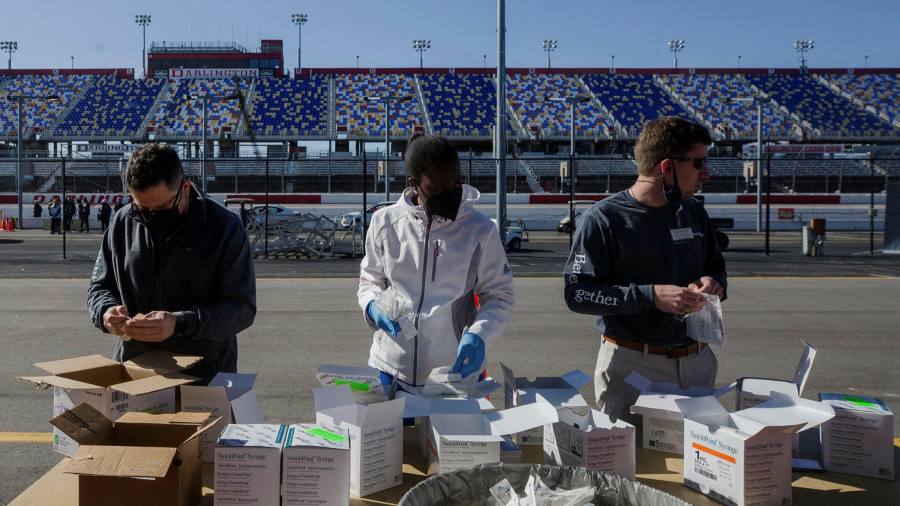[ad_1]
Six weeks ago Diana Rastegayeva started sending an email to friends and family containing tips to navigate the patchwork of state, local and private-sector providers offering coronavirus vaccine appointments.
Rastegayeva, who works for a pharmaceutical company, has now turned her mailshot into a website, becoming one of a growing number of experts helping eligible Americans navigate the country’s labyrinthine and highly localised vaccine distribution process. Her tips are as simple as knowing when pharmacies post new appointments to making sure someone has autofill set up to complete online registration forms more easily.
But while Rastegayeva has managed to secure 1,250 appointments for people in her home state of Massachusetts, she shares the concern of many experts that doses are not going to those who need it most, but rather those who know how to work the system.
“This system is not really good for anyone — the government should be doing this,†she told the Financial Times. “This is the embodiment of American individualism.â€
The US has now delivered first doses of a coronavirus vaccine to 21 per cent of its adult population, making it the sixth fastest Covid-19 vaccine programme in the world. On Saturday the country administered a record 2.9m shots, the White House announced on Monday.
But the rollout has been patchy, with states, local health departments, individual clinics and private pharmacy chains all running their own systems. On top of this, many states are now allowing anyone with an underlying condition to claim a vaccine — a group that can account for as much as 60 per cent of the population.
So many people are now eligible for so few doses that people are doing anything they can to secure highly sought-after appointments. Some are lining up for 12 hours outside supermarkets to secure unclaimed vaccines; others are tapping up networks of friendly pharmacists and nurses to find out when appointments become available; some are monitoring registration websites throughout the day and night.
As a result, those who are best able to navigate the various registration systems seem to be doing better at getting vaccinated.
A recent Financial Times analysis of five big metropolitan areas showed that richer and whiter neighbourhoods had far higher vaccination rates than poorer, minority ones.
Meanwhile, older Americans have received a far smaller proportion of vaccines than has been the case in the UK, for example. While more than 90 per cent of people aged 75 and over in Britain have received a vaccine, that figure is closer to 70 per cent in the US.
“If you run this fragmented, Ticketmaster-style rush, how is a 92-year-old who does not know how to use the internet supposed to navigate that?†said Kris Slevens, an IT engineer in New Jersey who is helping older people sign up for appointments.
The discrepancies are worrying many experts who have called for the US to do more to ensure those hit hardest by Covid-19 get the first vaccines.
Helene Gayle, who chaired a government-commissioned committee to recommend guidelines for vaccine prioritisation, said: “It will be important that public health systems continue or accelerate a focus on equity. Without that we do risk not only further issues of unequal access but reinforce mistrust of a system that once again doesn’t deliver for those at greatest risk.â€
In their hunt for a vaccine, many people are relying on contacts to help them secure a dose.
Scott Michelson, who works in healthcare in Washington DC but does not treat patients, was not eligible for a vaccine under the first phase of the city’s rollout. He was able to secure a dose, however, after a friend working in residential care told him they were about to throw out doses which were close to their expiry date.
“She messaged me on the day and I had to be there within a couple of hours,†he said. “But if I hadn’t claimed it, it would have been thrown away, which would have been terrible.â€
Some private companies are also helping their clients get vaccinated. Abe Malkin, medical director at the elite medical practice Concierge MD, said he had been inundated with requests from clients to help them get registered for a vaccine appointment.
“We are not booking the appointments themselves, but we are able to help people with the registration process,†he said.
Concierge MD is not charging people to help them get vaccinated, but others are. Slevens has banned dozens of people from his Facebook group for trying to charge fees of up to $250 to help people get appointments.
Slevens is one of a handful of people across the country now volunteering their time to make sure more have access to technical expertise.
One of the best ways to get an appointment, he says, is to pre-fill your data into a pharmacy registration website and then return to it in the early hours of the morning, ready to hit “confirm†as soon as new appointments are made available.
Rastegayeva said her top tip was simply to have as many browser windows open on as many devices as possible. “Each one is another lottery ticket,†she said. Demand for her services has been so high that she has recruited 300 volunteers and now has her own eligibility criteria, prioritising over-75s, non English-speakers and ethnic minorities.
Others have been similarly inundated after sharing their tips.
Nick Muerdter, a software engineer at the US National Renewable Energy Laboratory, says he now spends most of his time working on his website, which shows people where there are pharmacy vaccination appointments across the country. His bosses have even allowed him to develop it during work after they realised he could help free up colleagues, many of whom were spending large chunks of time trying to find appointments for themselves or loved ones.
“I am trying to rush updates out as quickly as I can,†he said. “I am just desperate that we soon get enough doses that there is no longer any demand for my website.â€
[ad_2]
Source link








